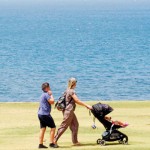News
Scorching heat raises risks for children’s health
View(s):By Nathara Abeywickrema
Extreme heat can negatively affect the physical activity of vulnerable groups such as children.
With annual sports meets and school cricket encounters scheduled, the physical and mental well-being of children and extreme heat are in focus again.
Nutrition specialist Dr. Renuka Jayatissa told the Sunday Times that not drinking enough liquids in dry weather conditions could increase the risk of kidney stones and urinary tract infections (UTIs).
“It can equally lower one’s physical and mental performance and salivary gland function, eventually leading to dehydration, which alone causes headaches and muscle cramps.’’
- People are advised to drink more water and avoid day time outdoor activities. Pix by Akila Jayawardena
Youngsters are at greater risk of dehydration than adults. Severe dehydration drives children to become lethargic in sports activities. Moderate and severe dehydration can cause a fast heart rate and lightheadedness, which could lead to cardiac arrest, she stressed.
The climate acts as a catalyst for hydration levels as well. Considering the change in weather, Dr. Jayatissa recommends that schools and other relevant institutions hold physical activities in the morning, between 6:30 am and 10 am, or between 4 pm and 6 pm.
She said certain educators forbid pupils from drinking water when they are instructing, and this needs to be addressed in full.
The Health Ministry’s Family Health Bureau (FHB) Director, Dr. Chitramalee de Silva, said schools should provide drinking water facilities to students, have a fully stocked first aid room, and educate staff and students about heat-related illnesses and safety measures to be followed in such cases.
Nutrition Society vice president and applied nutrition professor, Dr. Ananda Chandrasekara, said that due to their comparatively intense activity, athletes are especially prone to heat-related disorders.
“The human body can suffer greatly from excessive heat buildup, which may result in the highest risk of hyperthermia (a rise in body temperature as a result of prolonged exposure to the scorching sun) and, in extreme cases, can even be lethal.”
The three stages of hyperthermia—heat cramps, heat exhaustion, and heat stroke—occur when the body’s core temperature starts to increase, with the latter being the most dangerous.
Dehydration badly affects athletic performance. Running low on water and electrolytes can affect athletic performance.
Dr. Chandrasekera advised drinking at least 12 glasses of water a day and drinking coconut water, king coconut water, oral rehydration salts (Jeevani), sports drinks, or fresh fruit juice if symptoms of dehydration appear.
Lady Ridgeway Children’s Hospital Consultant Paediatrician Dr. Deepal Perera warned that intense heat not only caused dehydration but also raised the risk of skin irritation and sunburn.
These rashes normally go away as soon as the temperature drops, yet severe cases of heat rash may be brought to the attention of a skincare professional.
Dr. Perera said, “Keep the skin clean by bathing twice daily and using antibacterial soap or gel. One can apply ice cubes to itchy skin to help cool it off. Additionally, creams recommended by dermatologists also help reduce inflammation.
“Regular urine is transparent and ranges in colour from pale yellow to amber. Dehydration is frequently indicated by darker urine. If one notices that the urine is darker than normal and has no other symptoms, their ultimate fluid intake goal should be to make their urine return to a lighter colour.’’
Nutritionists recommend that people eat more watery vegetables, such as cucumber, watermelon, and local oranges.
Energy drinks can worsen the risk of dehydration, possibly because of their caffeine content.
Nutritionists also advise wearing light and loose-fitting clothes made of natural materials as much as possible, especially for children who will experience Miliaria, also known as prickly heat or sweat rash, during these warm months.
Avoid nylon lingerie that could harbour mycosis, also called fungal infections. Wear a wide-brimmed hat or cap and sunglasses, drink enough water, maintain a healthy diet, and minimise screen time, they advise.
The Ceylon Teachers’ Union (CTU) General Secretary, Joseph Stalin, attributed the health issues over sports meets to the academic calendar’s changes following the coronavirus pandemic. The sports meet season typically ends in January, he said.
Mr. Stalin said rural schools have been hit hard, with children facing a triple danger of learning impairment, poor nutrition, and challenges to well-being.
Most students have been rushed to hospitals in the Hambantota and Batticaloa Districts due to dehydration and sudden dizziness. Many of the cases are serious due to a drop in blood glucose levels.
“Many poverty-stricken families have less food, less clean water, poorer salaries, and worsening health as a result of extreme temperatures—a pathetic state that warrants careful consideration,” Mr. Stalin said.
The best way to say that you found the home of your dreams is by finding it on Hitad.lk. We have listings for apartments for sale or rent in Sri Lanka, no matter what locale you're looking for! Whether you live in Colombo, Galle, Kandy, Matara, Jaffna and more - we've got them all!




